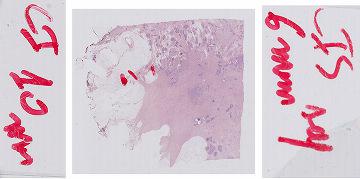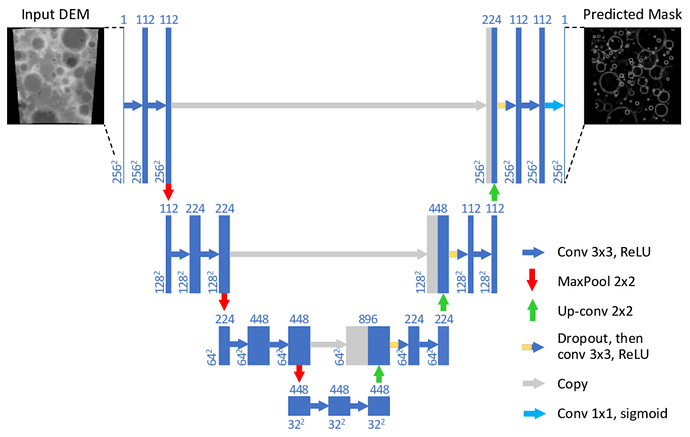Hello!
I’m new to machine learning and PyTorch, and I’m stuck on this error which seems really simple but I can’t find where to fix it:
ValueError Traceback (most recent call last)
~\AppData\Local\Temp/ipykernel_52832/2153252887.py in <module>
5 n_epochs = 10
6
----> 7 train_unet(unet, trainloader, valloader, optimizer, loss, n_epochs=n_epochs)
8 # test_unet(mlp_net, testloader, loss)
~\AppData\Local\Temp/ipykernel_52832/3077527990.py in train_unet(net, trainloader, valloader, optimizer, loss_function, n_epochs)
24
25 y_pred = net(X.float())
---> 26 y_loss = loss_function(y_pred, y)
27 y_dice = dice(y, y_pred)
28
~\AppData\Roaming\Python\Python39\site-packages\torch\nn\modules\module.py in _call_impl(self, *input, **kwargs)
1108 if not (self._backward_hooks or self._forward_hooks or self._forward_pre_hooks or _global_backward_hooks
1109 or _global_forward_hooks or _global_forward_pre_hooks):
-> 1110 return forward_call(*input, **kwargs)
1111 # Do not call functions when jit is used
1112 full_backward_hooks, non_full_backward_hooks = [], []
~\AppData\Roaming\Python\Python39\site-packages\torch\nn\modules\loss.py in forward(self, input, target)
711
712 def forward(self, input: Tensor, target: Tensor) -> Tensor:
--> 713 return F.binary_cross_entropy_with_logits(input, target,
714 self.weight,
715 pos_weight=self.pos_weight,
~\AppData\Roaming\Python\Python39\site-packages\torch\nn\functional.py in binary_cross_entropy_with_logits(input, target, weight, size_average, reduce, reduction, pos_weight)
3128
3129 if not (target.size() == input.size()):
-> 3130 raise ValueError("Target size ({}) must be the same as input size ({})".format(target.size(), input.size()))
3131
3132 return torch.binary_cross_entropy_with_logits(input, target, weight, pos_weight, reduction_enum)
ValueError: Target size (torch.Size([3, 3, 256, 256])) must be the same as input size (torch.Size([3, 65536]))
My model returns an output of size torch.Size([3, 65536]), while the labels are images of torch.Size([3, 3, 256, 256]).
The images are of size torch.Size([3, 3, 256, 256]) and not torch.Size([3, 256, 256]). The first 3 is the batch size, the second one is for the 3 RGB channels, and the 256s are the image dimensions.
Clearly, the model returns a size of 65536, which is 256*256, converting the image to a line. But how do I convert it back to a square? And how do I get rid of the batch size’s 3?
Here’s a reproducible code:
import torch
import torch.nn as nn
from torch.nn import Linear, Module, ModuleList, ReLU, Sequential, BCEWithLogitsLoss, Conv2d, ConvTranspose2d, MaxPool2d
from torch.optim import SGD, Adam
from torch.utils.data.dataloader import DataLoader
from torch.utils.data.dataset import Dataset
from skimage.io import imread
from skimage.transform import resize
from glob import glob
import os
import matplotlib.pyplot as plt
import numpy as np
class TissueDataset(Dataset):
def __init__(self, img_path, target_path):
super().__init__()
self.imgs = glob(os.path.join(img_path, "*.jpg"))
self.targets = glob(os.path.join(target_path, "*.jpg"))
def __getitem__(self, idx):
size = (3, 256, 256)
image = imread(self.imgs[idx])
label = imread(self.targets[idx])
image = resize(image, size, order = 1, preserve_range = True)
label = resize(label, size, order = 0, preserve_range = True).astype(int)
return image, label
def __len__(self):
return len(self.imgs)
def makeLoader(type):
dataloader = DataLoader(TissueDataset(
img_path = f'data/tissue/{type}/jpg',
target_path = f'data/tissue/{type}/lbl'
), batch_size = 3, shuffle = True)
return dataloader
trainloader = makeLoader('train')
valloader = makeLoader('val')
testloader = makeLoader('test')
class DoubleConv2d(Module):
def __init__(self, in_channels, out_channels):
super(DoubleConv2d, self).__init__()
self.stack = Sequential(
Conv2d(in_channels, out_channels, 3, 1, 1),
ReLU(),
Conv2d(out_channels, out_channels, 3, 1, 1),
ReLU()
)
def forward(self, x):
return self.stack(x)
class UNet(Module):
def __init__(self):
super(UNet, self).__init__()
inn = 3
out = 1
mid = [112, 224, 448]
self.encoder = ModuleList()
self.bottom = DoubleConv2d(mid[-1], 2*mid[-1]) # should both be mid[-1]?
self.decoder = ModuleList()
self.end = Conv2d(mid[0], 1*out, 1)
self.maxpool = MaxPool2d(2, 2)
#self.linear = Linear(65536, 10)
for dim in mid:
self.encoder.append(DoubleConv2d(inn, dim))
inn = dim
for dim in mid[::-1]:
self.decoder.append(ConvTranspose2d(2*dim, dim, 2, 2))
self.decoder.append(DoubleConv2d(2*dim, dim))
def forward(self, x):
connections = []
for i in range(len(self.encoder)):
module = self.encoder[i]
x = module(x)
connections.append(x)
x = self.maxpool(x)
x = self.bottom(x)
for i in range(len(self.decoder)):
module = self.decoder[i]
x = module(x)
if i % 2 == 0: # ConvTranspose2d
connection = connections.pop()
x = torch.cat((connection, x), dim=1)
x = self.end(x)
x = x.view(x.size(0), -1)
#x = self.linear(x)
return x
# print(UNet())
# unet = UNet()
# x = torch.randn(3, 3, 256, 256)
# out = unet(x)
def dice(ytrue, ypred):
if ytrue.dim() == 2:
inter = torch.dot(ytrue[i].reshape(-1), ypred[i].reshape(-1))
cardA = torch.sum(ytrue)
cardB = torch.sum(ypred)
num = 2 * inter + 1e-6
den = cardA + cardB + 1e-6
return num / den
elif ytrue.dim() == 3:
batch_size = ytrue.shape[0]
total = 0
for i in range(batch_size):
total += dice(ytrue[i, ...], ypred[i, ...])
return total / batch_size
return None
def train_unet(net, trainloader, valloader, optimizer, loss_function, n_epochs):
net = net.float()
t_size = len(trainloader.dataset)
v_size = len(valloader.dataset)
graphs = {
'train_loss' : [],
'val_loss' : [],
'train_dice' : [],
'val_dice' : []
}
for epoch in range(1, n_epochs+1):
net.train()
y_loss = 0
y_dice = 0
w_loss = 0
w_dice = 0
for X_batch, (X, y) in enumerate(trainloader):
X, y = X.to(device), y.to(device)
y_pred = net(X.float())
y_loss = loss_function(y_pred, y)
y_dice = dice(y, y_pred)
optimizer.zero_grad()
y_loss.backward()
optimizer.step()
if X_batch % 100 == 0:
net.eval()
w_loss = 0
w_dice = 0
for V_batch, (V, w) in enumerate(valloader):
V, w = V.to(device), w.to(device)
w_pred = net(V.float())
w_loss = loss_function(w_pred, w)
w_dice += dice(w, w_pred)
w_loss = w_loss / v_size
w_dice = w_dice / v_size
graphs['train_loss'].append(y_loss.item())
graphs['train_dice'].append(y_dice)
graphs['val_loss'].append(w_loss.item())
graphs['val_dice'].append(w_dice)
unet = UNet()
optimizer = Adam(unet.parameters(), lr=0.001)
loss = BCEWithLogitsLoss()
n_epochs = 10
train_unet(unet, trainloader, valloader, optimizer, loss, n_epochs=n_epochs)
Or if you prefer it as a file: https://we.tl/t-0oAjeZVZQ9
And here is the data: https://we.tl/t-9g3tUYCJ3d
Edit 1: Getting rid of the line x = x.view(x.size(0), -1) and using a batch size of 4 instead of 3 for clarity, the error becomes:
Target size (torch.Size([4, 3, 256, 256])) must be the same as input size (torch.Size([4, 1, 256, 256]))
Edit 2: Using sizes (3, 256, 256) for images and (1, 256, 256) for labels, and removing .astype(int) from the __getitem__ method gives this error:
TypeError: conv2d() received an invalid combination of arguments - got (builtin_function_or_method, Parameter, Parameter, tuple, tuple, tuple, int), but expected one of:
* (Tensor input, Tensor weight, Tensor bias, tuple of ints stride, tuple of ints padding, tuple of ints dilation, int groups)
didn't match because some of the arguments have invalid types: (!builtin_function_or_method!, !Parameter!, !Parameter!, !tuple!, !tuple!, !tuple!, int)
* (Tensor input, Tensor weight, Tensor bias, tuple of ints stride, str padding, tuple of ints dilation, int groups)
didn't match because some of the arguments have invalid types: (!builtin_function_or_method!, !Parameter!, !Parameter!, !tuple!, !tuple!, !tuple!, int)


